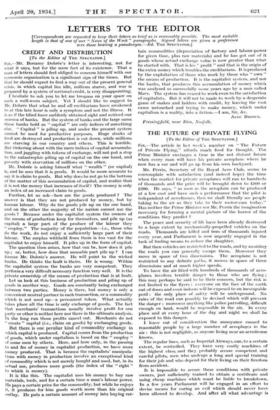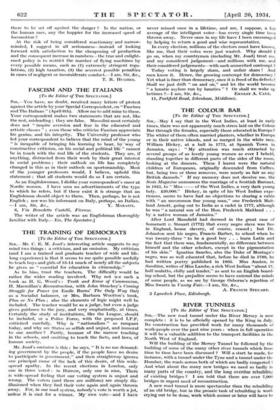THE FUTURE OF PRIVATE FLYING
[To the Editor of THE SPECTATOR.] SIR,—The article in last week's number on " The Future of Private Flying," affords much food for thought. The
Prime Minister envisages a time in the not distant future when every man will have his private aeroplane where he now has a car and will go up from his own backyard.
Mr. Perrin, Secretary of the Royal Aero Club, seems to contemplate with satisfaction (and indeed hope) the time when the market for private aeroplanes will run to hundreds of thousands and the price will be brought down to £100 or £200. He says, " as soon as the aeroplane can be produced at a low cost and have such a performance that the pilot is independent of aerodromes, then we shall literally sec people taking to the air as they take to their motor-cars today." Has neither the Prime Minister nor Mr. Perrin the imagination necessary for forming a mental picture of the horror of the conditions they predict ?
The peace and security of life have been already destroyed to a large extent by mechanically-propelled vehicles on the roads. Thousands are killed and tens of thousands injured every year, and Parliament is now urgently engaged in the task of finding means to reduce the slaughter.
But then vehicles are restricted to the roads, and by avoiding the roads you can generally escape them. Moreover they move in space of two dimensions. The aeroplane is not restricted to any definite paths, it moves in space of three dimensions and at much higher speeds.
To have the air filled with hundreds of thousands of aero- planes involves terrible danger to those who are flying ; this may perhaps be said to be their concern, but the risk is not limited to the flyers : everyone on the face of the earth out of doors and even indoors will be exposed to an inescapable peril : the only place of safety will be underground. No rules of the road can possibly be devised which will prevent the danger : moreover anything like police patrolling, difficult
enough on land, would be impossible in the air. In every place and at every hour of the day and night we shall be exposed to this danger.
I leave out of consideration the annoyance caused to reasonable people by a large number of aeroplanes in the air : this is not negligible, as anyone living near an aerodrome knows.
The regular lines, such as Imperial Airways, can, to a certain extent, be controlled. They have very costly machines of the highest class, and they probably secure competent and careful pilots, men who undergo a long and special training for their job and who depend for their living on their freedom from accident.
It is impossible to secure these conditions with private owners, just sufficiently trained to obtain a certificate and
using cheap machines which must be liable to breakdown. In a few years Parliament will be engaged in an effort to devise means for curing an evil which should never have been allowed to develop. And after all what advantage is
there to be set off against the danger ? Is the nation, or the human race, any the happier for the increased speed of locomotion ?
At the risk of being considered reactionary and narrow- minded, I suggest in all seriousness—instead of looking forward with satisfaction to the cheapening of production and the consequent increase in numbers—the true and enlight- ened policy is to restrict the number of flying machines by every possible means, such as (1) extremely stringent regu- lations, (2) high taxation, (3) the severest possible penalties in cases of negligent or inconsiderate conduct.—I am, Sir, &c.,
T. R. HUGHES.













































 Previous page
Previous page